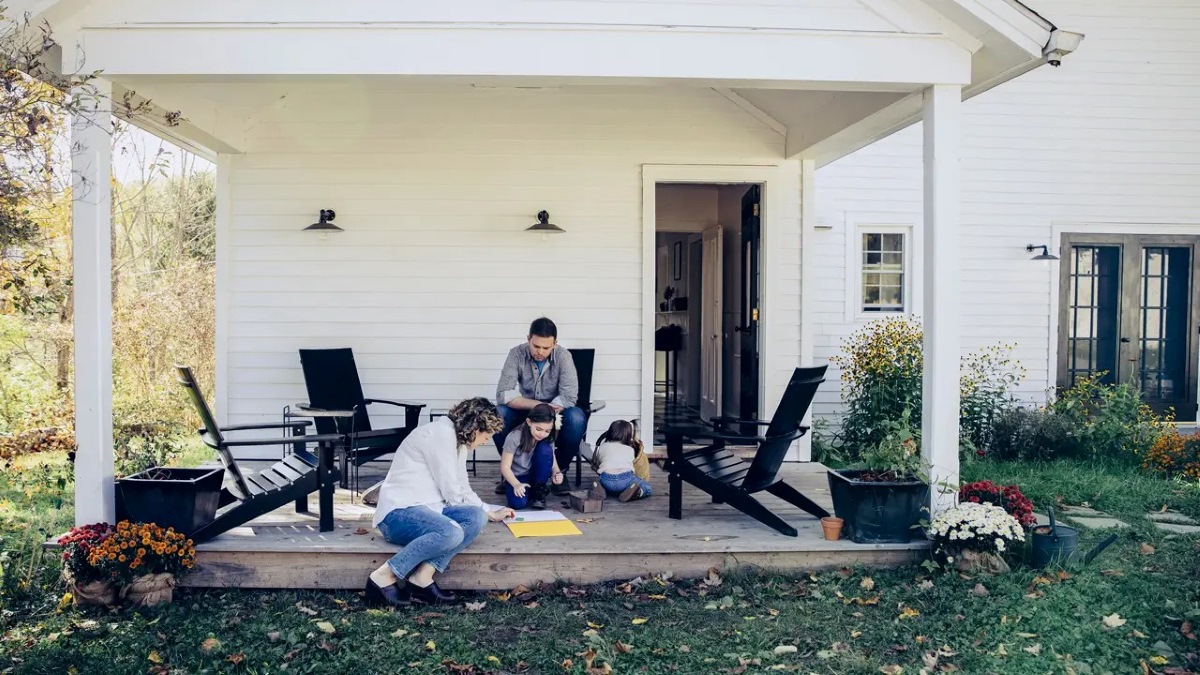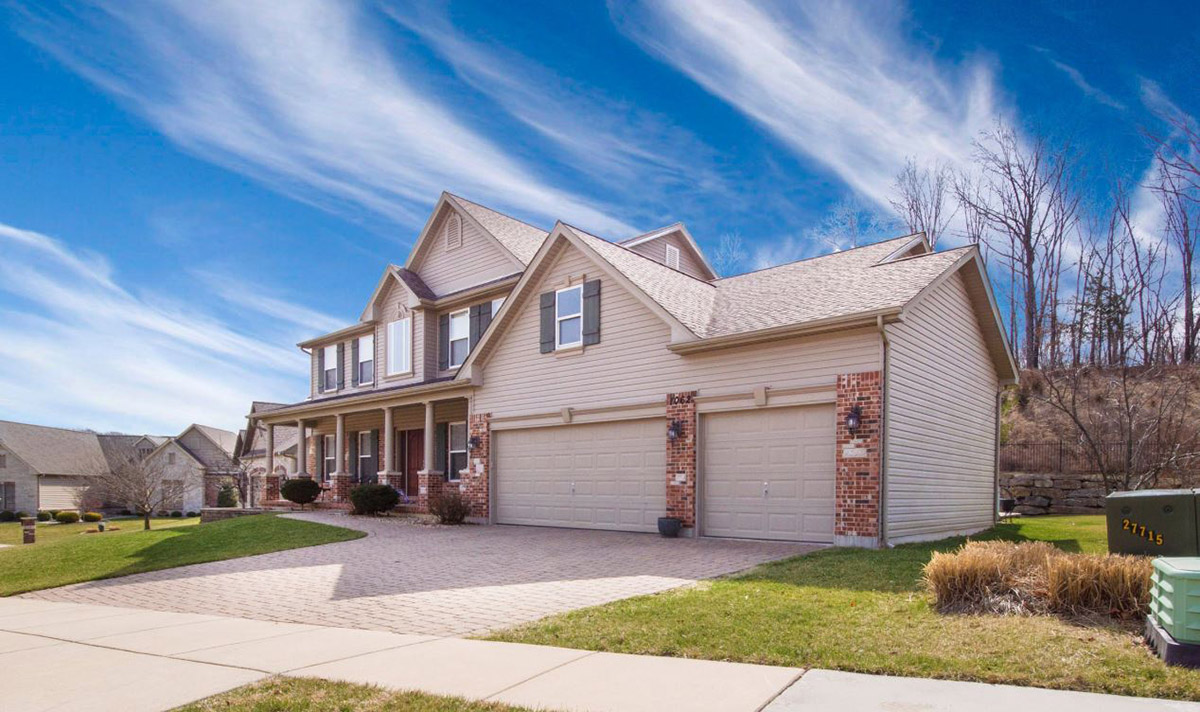

Finance
How Is House Insurance Calculated?
Published: November 9, 2023
Learn how house insurance is calculated and get important insights on how to manage your finances effectively.
(Many of the links in this article redirect to a specific reviewed product. Your purchase of these products through affiliate links helps to generate commission for LiveWell, at no extra cost. Learn more)
Table of Contents
Introduction
House insurance, also known as homeowners insurance, is a vital protection for one of your most valuable assets – your home. It provides coverage for damages to your house and its contents due to various perils, as well as liability coverage in case someone gets injured on your property. But have you ever wondered how house insurance premiums are calculated? Understanding the factors that influence the cost of your policy can help you make informed decisions and potentially save money.
Insurance companies take several aspects into account when determining the premium for your house insurance. These factors can vary from insurer to insurer, but there are common elements that most companies consider. By understanding these factors, you can gain insights into the process and make adjustments to potentially lower your premiums.
In this article, we will explore the various factors that insurance companies consider when calculating house insurance premiums. From location-based factors to personal characteristics, we will delve into the key aspects that influence the cost of your policy. So, let’s unravel the mysteries of house insurance calculations and gain a better understanding of how insurers determine the price you pay for your home protection.
Factors Affecting House Insurance Premiums
When it comes to calculating house insurance premiums, insurers take into account a wide range of factors. These factors can vary from one insurance company to another, but certain elements consistently play a significant role. Understanding these factors can help you comprehend why your premiums might be higher or lower compared to others. Let’s explore the key influences on house insurance premiums:
- Replacement Cost vs. Actual Cash Value: The type of coverage you choose can impact your premiums. Replacement cost coverage pays for the cost of repairing or rebuilding your home to its original condition, while actual cash value coverage takes into account depreciation. The replacement cost coverage generally leads to higher premiums due to the higher potential payout.
- Location-Based Factors: The location of your home greatly influences your insurance premiums. Insurers consider the risk associated with the area you live in, including the likelihood of natural disasters, crime rates, and proximity to fire stations. High-risk locations may result in higher premiums.
- Construction Materials and Age of the House: The construction materials used in your home and its age can impact insurance premiums. Houses built with fire-resistant materials and modern building techniques are seen as less risky and may lead to lower premiums. Older homes, particularly those with outdated wiring or plumbing systems, may have higher premiums due to increased risks.
- Home Security Measures: The security features of your home can have an impact on your premiums. Houses with burglar alarms, fire alarms, deadbolts, and other security measures are generally viewed as less vulnerable to theft and damage, which may result in lower premiums.
- Coverage Limits and Deductibles: The coverage limits you choose and the deductible amount you are willing to pay also affect your premiums. Higher coverage limits and lower deductibles can result in higher premiums, while lower coverage limits and higher deductibles may lead to lower premiums.
These are just some of the factors that can influence house insurance premiums. Other factors may include the size and structure of your home, the presence of specific amenities (such as a swimming pool), and even your insurance history or credit score. Insurers consider these factors collectively to assess the level of risk associated with insuring your home.
Replacement Cost vs. Actual Cash Value
When you purchase house insurance, one important decision you need to make is whether to opt for replacement cost coverage or actual cash value coverage. Understanding the difference between these two options can help you determine the level of coverage you need and how it affects your insurance premiums.
Replacement cost coverage pays for the cost of repairing or rebuilding your home to its original condition, without considering depreciation. In the event of a covered loss, such as fire or storm damage, your insurer will cover the expenses to rebuild your home with materials of similar quality and features. This coverage provides you with the greatest financial protection, as it helps ensure that you can replace your home without incurring substantial out-of-pocket expenses beyond your deductible. However, because the potential payout for replacement cost coverage is higher, premiums for this type of coverage tend to be higher as well.
Actual cash value coverage, on the other hand, factors in depreciation when determining the payout for a covered loss. Depreciation is the decrease in value over time due to wear and tear or age. If you have actual cash value coverage and experience a covered loss, your insurance company will reimburse you for the current value of the damaged property, taking into account depreciation. This means you may receive a lower payout than what it would cost to fully replace or repair your home. Actual cash value coverage typically results in lower premiums compared to replacement cost coverage.
Choosing between replacement cost and actual cash value coverage depends on your individual circumstances. If your goal is to have the financial means to completely rebuild your home as it was before the loss, replacement cost coverage is the better option. This is especially important if you live in an area prone to natural disasters or if your home has unique features that would be costly to replicate.
On the other hand, if you are comfortable with the possibility of receiving a lower payout that considers depreciation, actual cash value coverage may be a more affordable choice. It is important to note that actual cash value coverage may not provide enough funds to fully rebuild or repair your home to its pre-loss condition, especially if your home experiences significant damage.
Ultimately, the choice between replacement cost and actual cash value coverage is a personal decision based on your risk tolerance and financial situation. Discussing your options with an insurance agent can help you make an informed decision and understand how each choice affects your premiums.
Location-Based Factors
Location is a key factor that insurance companies consider when calculating house insurance premiums. The risk associated with the area where your home is located plays a significant role in determining your rates. Insurers analyze various location-based factors to assess the likelihood of future claims and the potential costs involved.
Natural Disasters: The risk of natural disasters plays a crucial role in determining house insurance premiums. If your home is located in an area prone to hurricanes, earthquakes, floods, or wildfires, insurers will factor in the increased risk of property damage when setting your premium. The cost of repairing or rebuilding homes affected by such disasters can be significant, leading to higher premiums in high-risk areas.
Crime Rates: The level of crime in your area can also affect your house insurance premiums. If your neighborhood has a high crime rate, insurers consider the increased likelihood of theft, vandalism, and property damage. Homes located in areas with lower crime rates are viewed as less risky and may result in lower insurance premiums.
Proximity to Fire Stations: The distance between your home and the nearest fire station is another location-based factor that insurers assess. Houses located closer to fire stations are generally seen as less vulnerable to extensive fire damage. Therefore, if your home is in close proximity to a fire station, it may lead to lower insurance premiums.
Weather Patterns: The climate and weather patterns in your area can impact your insurance premiums. Regions with a higher frequency of severe storms, hail, or wind damage may incur higher premiums due to the increased risk of property damage. Insurers consider historical weather data to assess the potential costs associated with weather-related claims.
Building Codes and Regulations: Insurers also take into consideration the local building codes and regulations in your area. Homes built in compliance with the latest building codes, which often include safety and hazard prevention measures, are typically seen as lower risk. As a result, insurance premiums for homes adhering to updated building codes may be lower compared to those that do not meet the requirements.
It’s important to note that the specific location-based factors considered by insurance companies can vary. Some companies may give more weight to certain factors over others. However, in general, the riskier the location, the higher the insurance premiums are likely to be. Understanding the location-based factors that influence your premiums can help you make informed decisions about the type and level of coverage you need for your home.
Construction Materials and Age of the House
The construction materials used in your home and its age are important factors that insurance companies consider when calculating house insurance premiums. These factors provide insights into the potential risks and costs associated with insuring your property.
Construction Materials: The materials used to build your home can impact its vulnerability to different perils, such as fire or wind damage. Houses constructed with fire-resistant materials, such as brick or concrete, are generally viewed as lower risk by insurers. These materials are less likely to catch fire or suffer extensive damage in the event of a fire, leading to potentially lower premiums. On the other hand, homes made of combustible materials, such as wood, may have higher insurance premiums due to the increased risk of fire damage.
Age of the House: The age of your home is another important consideration for insurance companies. Older homes may have outdated electrical, plumbing, and heating systems, which can increase the risk of accidents or damage. In addition, building codes and safety standards have evolved over time, and older homes may not meet current requirements. As a result, insurers may view older homes as higher risk and charge higher premiums. However, well-maintained older homes that have been updated to meet modern safety standards may receive more favorable premiums.
Insurers may also consider the overall condition of the house when assessing risk. Homes that have undergone regular maintenance and have been kept in good condition are generally seen as lower risk. Conversely, neglected or poorly maintained homes may have higher premiums due to the increased likelihood of damage and higher repair costs.
When applying for house insurance, it’s important to provide accurate information about the construction materials and age of your home. Failing to disclose this information accurately can lead to issues when filing claims. In some cases, insurance companies may even deny the claim if they discover that false information was provided.
Before purchasing a home or renewing your insurance policy, it can be helpful to consult with an insurance agent. They can guide you on any specific requirements or considerations based on the construction materials and age of your home, ensuring that you have adequate coverage in place.
Home Security Measures
The security features of your home can have a significant impact on your house insurance premiums. Insurance companies consider the level of security in your home when assessing the risk of burglary, vandalism, and other perils. By implementing certain security measures, you may be able to lower your premiums while also safeguarding your property and loved ones.
Burglar Alarms: Installing a burglar alarm system in your home can help deter thieves and reduce the risk of burglary. Insurance companies view homes with burglar alarms as less likely to be targeted, leading to potential premium discounts. Make sure to choose a system that is professionally monitored and meets industry standards for maximum effectiveness.
Fire Alarms and Smoke Detectors: Having functioning fire alarms and smoke detectors in your home is not only a vital safety measure but also a factor that insurers consider when calculating premiums. These devices alert you to the presence of smoke or fire, providing early warning and potentially reducing damage. Ensuring that you have working fire alarms and smoke detectors installed throughout your home can lead to insurance savings.
Deadbolts and Secure Locks: Strong and secure locks on your exterior doors, such as deadbolts, can enhance the security of your home and reduce the risk of break-ins. Insurance companies often offer discounts for homes with high-quality locks, as they are seen as a deterrent to potential burglars.
Security Cameras: Installing security cameras on your property can provide surveillance and evidence in case of a break-in or other security incidents. Insurance companies may offer premium discounts for homes with security camera systems, as they increase the likelihood of identifying and apprehending intruders.
Home Security Systems and Monitoring: Comprehensive home security systems that include a combination of burglar alarms, fire alarms, and surveillance cameras, along with professional monitoring, can significantly enhance the security of your home. Insurance companies often provide premium discounts for homes with professionally monitored security systems, as they provide round-the-clock protection and additional peace of mind.
Security Gates and Fences: If you have security gates or fences around your property, it can act as a deterrent to unauthorized access and increase the overall security of your home. Insurance companies may consider these physical barriers when calculating your premiums and may offer discounts as a result.
When considering security measures for your home, it’s important to check with your insurance company to understand any specific requirements or recommendations. They can provide guidance on eligible discounts and the level of security that can lead to premium reductions. By investing in these security measures, not only can you potentially save on insurance costs but also create a safer environment for you and your family.
Coverage Limits and Deductibles
The coverage limits and deductibles you choose for your house insurance play an essential role in determining your premiums. These factors determine the level of financial protection you have and the amount you are responsible for paying out-of-pocket in the event of a claim.
Coverage Limits: The coverage limit is the maximum amount that your insurance policy will pay for covered losses. It represents the total value of your home and its contents that are protected. When setting your coverage limits, it’s important to consider the replacement cost of your home and belongings. Insurance companies may require an appraisal or estimate to determine an appropriate coverage limit. Higher coverage limits generally result in higher premiums, as it increases the potential payout for a claim.
Deductibles: The deductible is the amount you must pay out-of-pocket before your insurance policy kicks in to cover the remaining expenses. For example, if you have a $1,000 deductible and file a claim for $5,000 in damages, you would pay the first $1,000, and the insurance company would cover the remaining $4,000. Deductibles can vary based on the type of coverage and the insurance company. Choosing a higher deductible can lower your premiums, as it shifts more of the financial responsibility for small claims onto you. However, it’s crucial to ensure that you can comfortably afford the deductible amount in case of a claim.
When determining the coverage limits and deductibles for your house insurance, it’s important to strike a balance between adequate protection and affordable premiums. Consider the value of your home and belongings, your financial situation, and your risk tolerance. Assessing the potential costs of rebuilding or repairing your home and replacing your possessions can help you determine appropriate coverage limits. Additionally, evaluating your ability to comfortably pay a particular deductible amount can guide you in selecting an appropriate deductible.
It’s also important to review and update your coverage limits and deductibles periodically to ensure they align with any changes to your home’s value or your financial circumstances. As your home appreciates or if you acquire high-value items, you may need to adjust your coverage limits accordingly. Likewise, reassessing your deductible can help ensure it remains affordable while still providing you with potential savings on your premiums.
Consulting with an insurance professional can provide valuable guidance in making decisions about coverage limits and deductibles. By understanding the impact these choices have on your premiums and overall financial protection, you can make informed decisions that suit your needs and budget.
Personal Factors
In addition to location-based factors and the characteristics of your home, insurance companies also take your personal factors into account when calculating house insurance premiums. These personal factors provide insurers with insights into your level of risk and likelihood of filing a claim. Here are some of the personal factors that can influence your premiums:
Claims History: Your claims history is a significant factor that insurers consider. If you have a history of filing frequent claims or large claims, insurance companies may view you as a higher risk and charge higher premiums. On the other hand, if you have a clean claims history, you may be eligible for lower premiums, as you are considered a lower risk for future claims.
Credit Score: Your credit score can also impact your house insurance premiums. Insurance companies often use credit-based insurance scores, which are based on your credit history, to assess risk. Statistically, individuals with lower credit scores have been found to file more insurance claims. As a result, those with lower credit scores may face higher premiums, while those with higher credit scores may be eligible for lower premiums.
Occupation: In some cases, your occupation can affect your house insurance premiums. Certain professions may be considered higher risk by insurance companies due to safety concerns or increased probability of filing a claim. For example, occupations that involve more traveling or hazardous work may result in higher premiums.
Insurance History and Loyalty: Your insurance history and loyalty to a particular insurer can also influence your premiums. If you have a long history of continuous coverage with the same insurance company and no claims, you may be eligible for loyalty discounts. On the other hand, if you have a history of gaps in coverage or frequently switch insurers, it may result in higher premiums.
Age and Marital Status: Insurers often consider your age and marital status when calculating premiums. Younger homeowners may face higher premiums due to perceived higher risk, while mature homeowners may be eligible for lower premiums. Additionally, married couples may benefit from lower premiums compared to single individuals, as statistics show that married individuals tend to file fewer claims.
Smoking Habits: Smoking is a personal habit that can impact your insurance premiums. Smoking increases the risk of fire and can lead to higher premiums due to the increased likelihood of property damage.
It’s important to note that the impact of personal factors on house insurance premiums can vary among insurance companies. Each company may weigh these factors differently, and some insurers may place more emphasis on certain factors over others. Working with an insurance agent or broker can help you understand how your personal factors may affect your premiums and assist you in finding the most suitable coverage options.
Claims History
Your claims history is an important factor that insurance companies consider when determining your house insurance premiums. It provides insurers with insights into your past experiences with filing claims and the likelihood of you making future claims. Your claims history gives an indication of the level of risk you pose as an insured homeowner. Here’s how your claims history can impact your premiums:
Frequency of Claims: The number of claims you have filed in the past is a significant consideration for insurers. If you have a history of frequent claims, it may indicate a higher likelihood of future claims. Insurance companies view frequent claims as a potential financial risk, as they may have to regularly pay out to cover your losses. As a result, homeowners with a history of multiple claims may be subject to higher premiums.
Severity of Claims: Insurers not only consider the frequency of claims but also the severity of those claims. If you have filed claims for substantial losses in the past, it may raise concerns for insurance companies. Multiple or significant claims may suggest a higher likelihood of future large claims. As a result, homeowners with a history of severe claims may face higher premiums to account for the increased potential costs associated with future claims.
Type of Claims: The type of claims you have filed also plays a role in determining your premiums. If your claims history shows a pattern of claims related to theft, water damage, or other perils, insurers may consider your home at higher risk for those specific issues. Homeowners with a history of claims related to specific perils may face higher premiums to account for the increased likelihood of future claims related to those perils.
Insurance Claims Free Discount: On the other hand, if you have a history of few or no claims, you may be eligible for an insurance claims free discount. Insurance companies often provide premium discounts to homeowners who have not filed recent claims. This reward for maintaining a claims-free history can result in lower premiums.
It’s important to note that some insurance companies have forgiveness programs that overlook the first claim or minor claims when calculating premiums. They may focus more on the frequency and severity of claims rather than individual incidents. However, if you have a history of multiple claims, it may still impact your premiums.
To maintain a favorable claims history and potentially save on premiums, it’s important to consider whether filing a claim is necessary for every incident. Making multiple small claims can increase the likelihood of facing higher premiums or even policy non-renewal. Evaluating the cost of the claim against potential premium increases can help you make an informed decision.
When switching insurance providers, it’s crucial to be honest about your claims history. Insurance companies can access your claims history through a shared database, and providing false information may lead to future claims being denied or policy cancellation.
By understanding the impact of claims history on your house insurance premiums, you can make informed decisions and take necessary steps to maintain a favorable claims record. Discussing your claims history and its influence on your premiums with an insurance agent can provide valuable insights and guidance in selecting the best coverage options for your needs.
Credit Score
Your credit score is a personal financial factor that can have an influence on your house insurance premiums. Insurance companies often use credit-based insurance scores, derived from your credit history, to assess the level of risk you pose as a policyholder. While it may seem unrelated, there is a statistical correlation between credit history and the likelihood of filing insurance claims. Here are some key points regarding how your credit score can impact your house insurance premiums:
Insurance Credit Scores: Insurance credit scores are different from traditional credit scores used by lenders. Insurance companies use specific scoring models that analyze your credit history and other factors, such as payment history and outstanding debt, to calculate your insurance credit score. The higher your insurance credit score, the lower the perceived risk and the potential for lower premiums.
Statistical Correlation: Studies have shown a correlation between lower insurance credit scores and a higher likelihood of filing insurance claims. While the reasons for this correlation are complex and can vary, insurance companies use these statistical trends to assess the level of risk associated with policyholders. As a result, individuals with lower credit scores may face higher premiums.
Impact on Premiums: Insurance companies typically place policyholders into different rating tiers based on their insurance credit scores. Those in higher tiers are considered lower risk and may receive lower premiums, while those in lower tiers may face higher premiums. The impact of credit scores on premiums can vary depending on the insurer and the state’s regulations.
Limited or Prohibited Use: It’s important to note that some states limit or prohibit the use of credit scores for insurance purposes. These regulations ensure that credit scores are not the sole factor in determining premiums, and insurers must consider other relevant factors as well.
Improving Your Credit Score: If you have a lower credit score and are concerned about its impact on your insurance premiums, there are steps you can take to improve your credit over time. This includes paying bills on time, reducing outstanding debt, and monitoring your credit report for any errors or discrepancies.
It’s worth mentioning that credit-based insurance scores are just one of the many factors insurance companies use to determine premiums. Other considerations such as claims history, location, and home characteristics also play significant roles. Furthermore, not all insurance companies use credit scores in their underwriting process, so it’s important to inquire about their specific practices and policies.
Discussing the impact of credit scores on your house insurance premiums with an insurance agent can provide you with a better understanding of how your specific credit history may influence your rates. They can also provide guidance on ways to potentially mitigate the impact or offer advice on steps to improve your credit score over time.
Conclusion
Understanding how house insurance premiums are calculated is essential for homeowners seeking to protect their most valuable asset. Insurance companies take into account a variety of factors, including replacement cost vs. actual cash value, location-based factors, construction materials, home security measures, coverage limits, deductibles, and personal factors. Each factor plays a role in assessing the level of risk associated with insuring your home.
Location-based factors such as natural disasters, crime rates, proximity to fire stations, and weather patterns provide insights into the risks specific to your area. Construction materials and the age of your home indicate its vulnerability and maintenance requirements. Installing security features like burglar alarms, fire alarms, and surveillance cameras can help reduce the risk of theft and damage, potentially leading to lower premiums. Choosing appropriate coverage limits and deductibles ensures adequate financial protection while balancing affordability.
Personal factors like claims history, credit score, occupation, and insurance history are also taken into consideration by insurers. A history of frequent or severe claims may result in higher premiums, while a claims-free history can lead to discounts. Credit scores are used to assess the risk of filing claims and can impact premiums as well.
In conclusion, understanding the factors involved in calculating house insurance premiums empowers homeowners to make informed decisions. By assessing their unique circumstances, homeowners can take steps to mitigate risks, implement security measures, and select appropriate coverage options that strike a balance between protection and affordability. Regularly reviewing and updating coverage limits, deductibles, and security measures can ensure ongoing suitability and potentially reduce premiums over time.
When purchasing house insurance or renewing a policy, it is highly recommended to consult with an insurance professional. They can provide personalized guidance, recommend appropriate coverage, and help navigate the complexities of insurance premium calculations. By being proactive and informed, homeowners can secure the necessary protection for their homes and possessions while optimizing their insurance costs.














